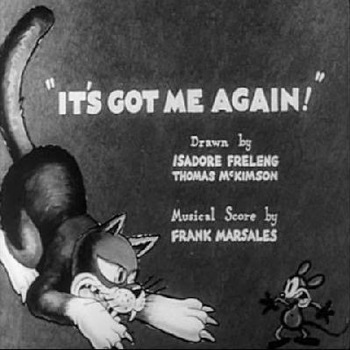A Year in Shorts Day 292: "It's Got Me Again!"
While Walt Disney dominated the category for Best Animated Short throughout the entirety of the 1930s, his main competition was right there alongside him from the very beginning. Sure, Flowers and Trees won the very first Oscar in the category. And yes, Disney received another nomination for Mickey’s Orphans. But taking up the third spot on the slate was It’s Got Me Again!, one of the very first Merrie Melodies. Eventually Warner Bros. Animation would become a powerhouse in its own right, surpassing the Mouse in terms of quality and respect amongst animation scholars, if still lagging behind in money, Oscar wins and global ubiquity. Of course it’d be a long road to get there. And as anyone who has seen this 1932 short can attest to, it was one with a pretty rocky start.
The premise, at least, is fairly easy to summarize. Directed by Rudolf Ising, a very important but relatively obscure figure in the Golden Age of Animation, It's Got Me Again! follows a nest of mice (FUN FACT- A group of mice is properly referred to as a "nest") hanging out in a music store. It's interesting to note (and absolutely not a coincidence) that these mice all bear a certain resemblance to Mickey. The filmmakers don't really do anything with this, so it's really just a reference for its own sake, but still. Of course, this is a cartoon, so any gathering of mice has to be interrupted by a cat; I think that was just the law in those days. But as in all cartoons, the cat is no match for the mice, and a series of comical hijinks ensue. Come to think of it, It's Got Me Again! has a fair bit in common with Mickey's Orphans. From the cat/mouse conflict, the cartoon destruction, even the fact that it's in black and white. Hell, there are some moments which are so similar it almost seems like one of the studios HAD to have been copying the other. And much like that film, it's really not that funny.
Look, it isn't as if the short is horrible or anything. There's just not much there there, you know? I guess if I wanted to be charitable, I could say that the short is bouncy, quickly paced and mostly inoffensive. I mean, it could be worse! It could be racist. There is a rather odd reference to The Jazz Singer in there with a mouse yelling "Mammy!", but without context it comes across as a non sequitur more than anything. (There is of course the broader argument that Mickey Mouse's design, which is coopted here, is derived from minstrel shows, and therefore its use is here as well, but that's a whole conversation I am neither qualified nor inclined to have.) But even though this short could be worse, it sure as hell could be a lot better too, and none of the stuff we expect from our Merrie Melodies are on display here. And I suppose that's rather unfair for us to expect, isn't it? After all, this is a very early entry in the series, and Warner hadn't found its footing yet. It's easy, in 2021, knowing what we know now about the works of Tex Avery, Friz Freleng and Chuck Jones, to look at this short and judge it for not living up to those high standards. In the context in which this short was released, it was probably much different. I bet that in 1932 all this comic violence and silly dancing was seen as state-of-the-art stuff. But I don't live in 1932, and it's pretty silly to try and pretend otherwise. And at the end of the day, a comedy short that doesn't make me laugh simply isn't a good comedy short. I'm willing to give It's Got Me Again! the benefit of the doubt, but that only goes so far. The short certainly has an important place in history, but for anyone besides the most hardcore of Looney Tunes devotees, that place is nothing more than a footnote.
Keep up with the Oscar Baiting here on Letterboxd!
The Great Oscar Baiter is a not-for-profit work of criticism. All images herein are property of their respective owners and are protected under Fair Use.

Comments
Post a Comment